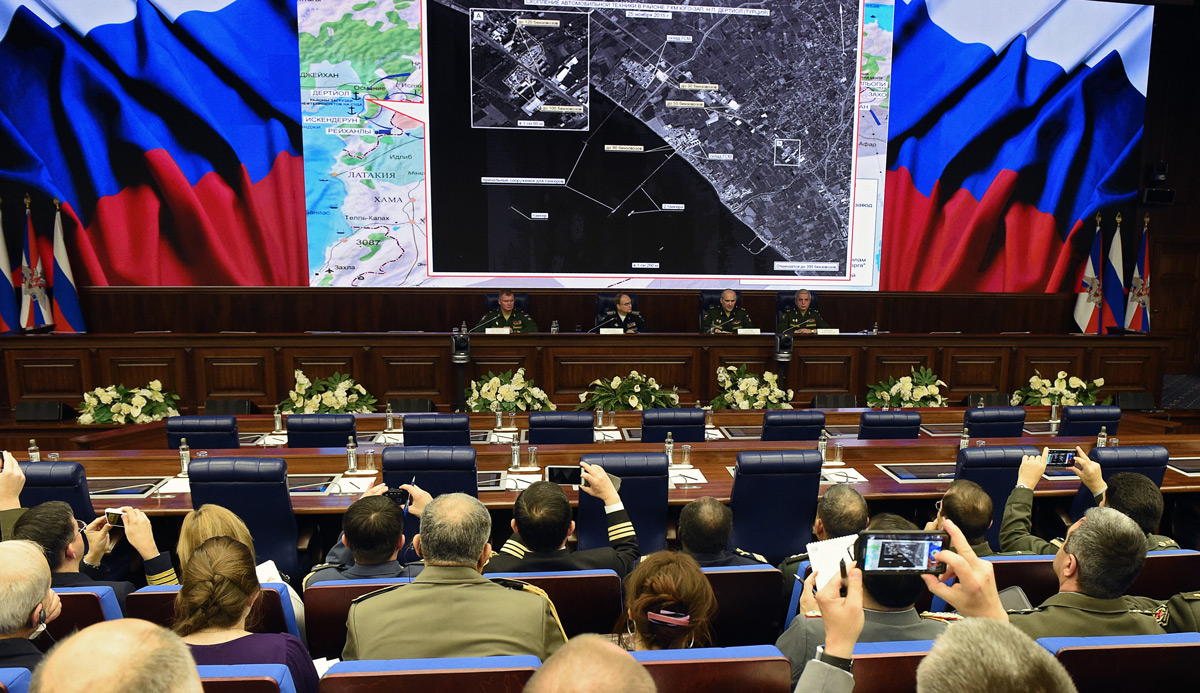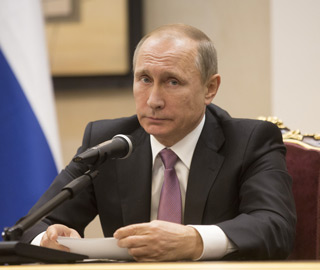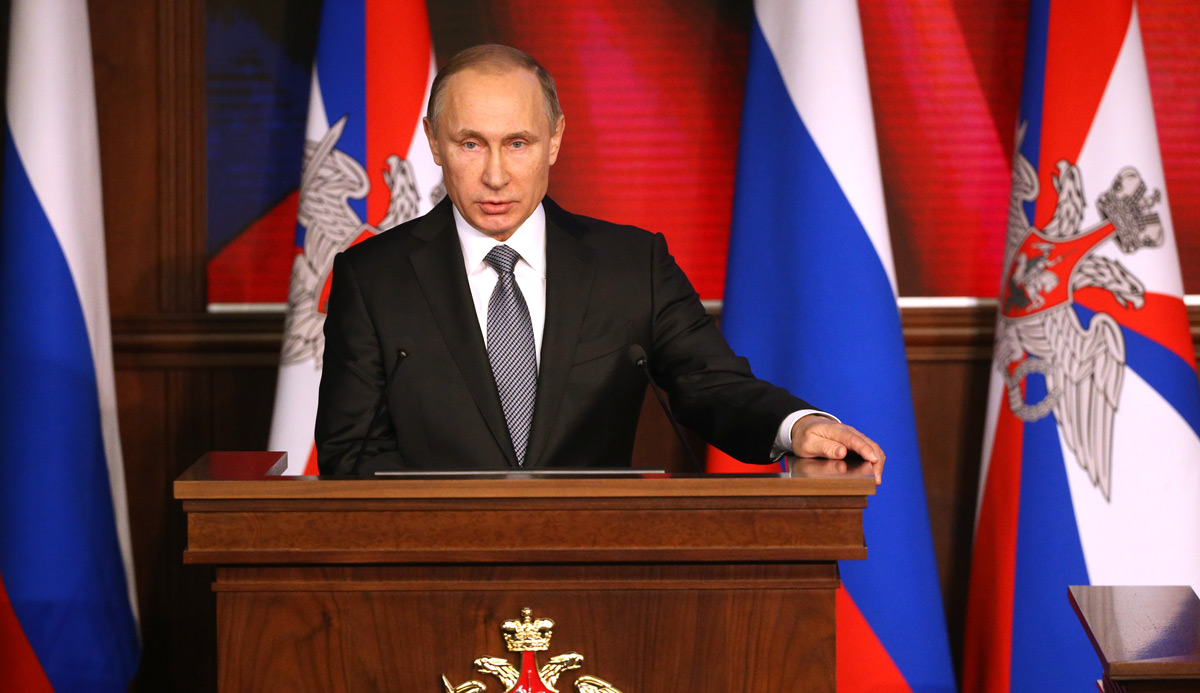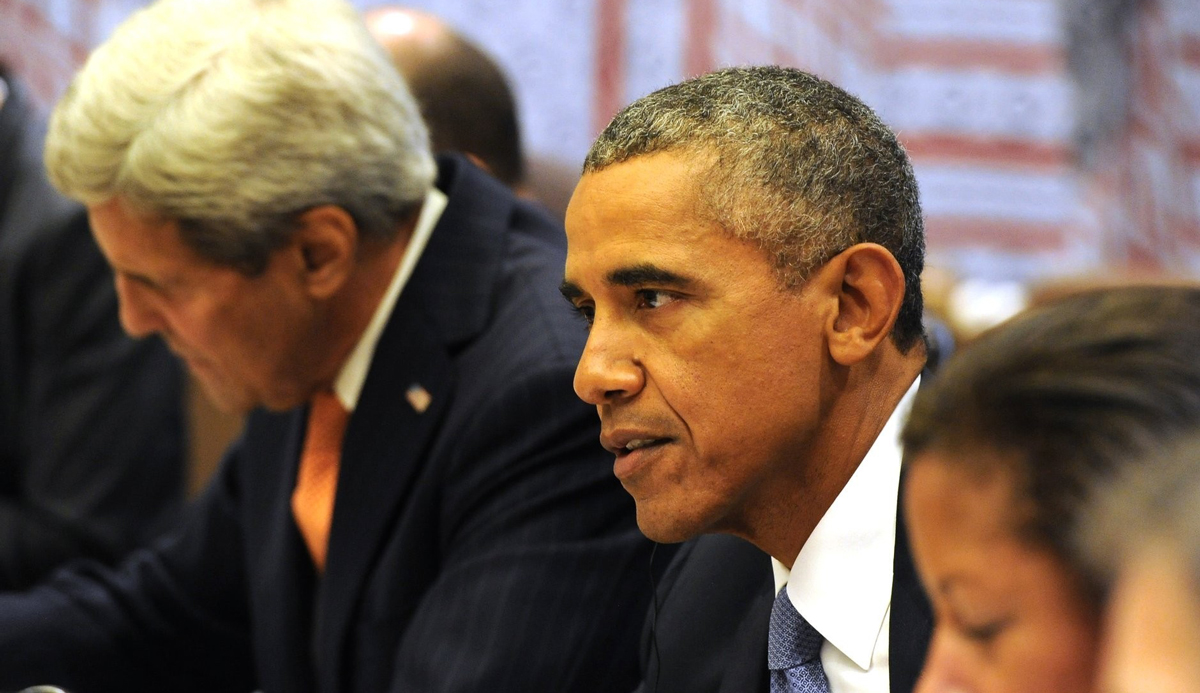It is not often that one agrees with the general conclusion of a thesis and rejects its premise. But in reading Michael Doran’s essay, “Our Man in Moscow,” that is where I find myself. His conclusions about the implications of the Obama administration’s approach to Syria for Russia’s positions in the region and beyond it in Europe are, I believe, generally correct. There can be little doubt that America’s traditional partners in the Middle East do feel the need—as Doran suggests—to establish a “productive working relationship with Moscow,” and that Putin now has far greater influence in the region as a whole.
Whether this will remain true over time is a different question, particularly because the next president can do much to alter this reality. However, although Putin has surely gained in response to President Obama’s hesitancy in Syria, Doran seeks to explain that Obama has been driven by a deliberate strategy to make Russia and Iran part of a concert of powers aimed at fostering a new order in the Middle East. In other words, Putin’s gain is not the result of the lack of a strategy on the part of the president—or his fear of getting sucked into what he perceived as a quagmire in Syria—but the consequence of a very conscious design to make Russia and Iran arbiters in the region.
I know that for many in the Middle East, nothing happens by accident. That is why I have often said that in the Middle East, conspiracy is like oxygen and everyone breathes it. But American policy analysts should know better. Contrary to Doran’s thesis, President Obama’s policy was not part of some grand plan that he kept hidden from the American public and those working for him.
I was there for the first three years of the administration. The reset with Russia and the outreach to Iran—for Doran, the two key elements of Obama’s plan for a new order in the Middle East—were not part of a grand Kissingerian geopolitical concept. The aims were more prosaic and immediate.
If there was one broad area that President Obama was preoccupied with when he assumed office, it was stopping nuclear proliferation and ensuring the safety of nuclear materials. Yes, he wanted a new strategic-arms-limitation agreement with Russia—something he saw as connected to these two priorities. Even more, he wanted to make sure that Iran would not acquire a nuclear weapon and to be seen as credible in preventing it. He understood not simply that an Iran with a nuclear weapon might spell the end of the nuclear non-proliferation regime, but that Israel would feel driven to act militarily to stop the Iranians—and he hoped to prevent a new Middle East war.
The reset with Russia could help in pursuing these objectives, and especially with regard to Iran. If we were to affect Iran’s behavior, its leaders needed to see that they were alone and isolated. Outreach to Iran was designed to test, in the first instance, whether diplomacy could halt the Islamic Republic’s march toward a nuclear weapon—they had 5,000 centrifuges in 2009 when Obama took office. But we also knew that outreach would create real pressures on the Iranian leadership. On the one hand, the issue of dealing with the U.S. was very divisive within the Iranian elite. On the other hand, if the Iranians refused our outreach, whether because of its divisiveness or because of the Supreme Leader’s fear that dealing with us would erode the regime’s resistance ideology, we could mobilize far greater international support for much tougher sanctions against Iran.
Conceptually, our approach, which I helped to shape in the first term, was designed to build real pressure on the Iranians but leave them a way out if they wanted to take it—with the objective being that in the end we would be willing to roll back the sanctions in return for a far-reaching rollback of Iran’s nuclear infrastructure. Clearly, the approach would be far more effective if the Russians joined us in this, and that was one key motivation for the “reset.” So much so, that in his final phone call to nail down the START agreement with Russia’s then-president, Dmitri Medvedev (a call in which I was involved), Obama actually pressed him on the need for tougher sanctions against Iran, later to be incorporated in UN Security Council Resolution 1929.
Contrary to Doran’s argument, then, the policy President Obama authorized at the outset of the administration was aimed not at drawing in Iran but at isolating it. Secretary of State Hillary Clinton, Secretary of Defense Robert Gates, CIA director Leon Panetta, and National Security Adviser Thomas Donilon were all very much of one mind in terms of pressuring Iran. None of them saw this as a policy that in the end would make Iran an arbiter of the Middle East landscape. Just the opposite: they all saw it as a way not only of stopping the Iranian nuclear-weapons program but also of countering Iran’s ambition to achieve regional hegemony.
That was certainly also my position, and in the spring of 2009 I was sent to explain our policy to Arab leaders, starting with King Abdullah of Saudi Arabia. General John Allen, then the number two in Central Command, joined me. Together, we made it clear not only that President Obama was determined to prevent Iran from acquiring nuclear weapons but that he had also authorized an extensive buildup of our military capabilities in the region to counter the whole spectrum of Iranian threats. Indeed, in an early meeting with our own defense officials in which I took part, Obama had spelled out exactly what he meant in saying that all options were on the table regarding the Iranian nuclear program: “If I decide that diplomacy is not going to work and have to use force, don’t come back to me and say we don’t have what we need to do the job. But don’t develop that capability in a way that makes it my only option.”
Truth be told, President Obama adopted a tough position toward Iran throughout his first term, especially after the Iranians rejected our outreach and retreated from a deal that would have supplied fuel rods for their research reactor if they shipped 80 percent of their low-enriched uranium out of the country. He was always willing to negotiate, but saw little possibility of this leading anywhere so long as Mahmoud Ahmedinejad remained the Iranian president. As a result, the administration’s approach focused largely on ratcheting up the sanctions, plugging holes in the sanctions regime, and expanding our military reach and exercises in the region.
During his second term, and with the 2013 election of Hassan Rouhani as Iran’s president, the president’s belief in the possibility of a deal would change. Not only did Rouhani run against the policies that had produced Iran’s isolation, but he also pledged to use diplomacy to lift the sanctions. A back channel established through Oman now finally yielded Iranians authorized to negotiate discreetly with the U.S., and this convinced Obama —and his new lineup of senior advisers—that a deal curtailing the Iranian nuclear program was possible.
The bottom line of what the administration would accept in such a deal changed. In the first term, with Clinton, Panetta, and Donilon in place, the approach had been much more about reducing the nuclear infrastructure to the point where its small size would limit Iran’s ability ever to become a nuclear-weapons state and would in itself be an indicator of peaceful intent. In the second term, President Obama, Secretary of State John Kerry, and others concluded that we could not get the Iranians to accept such an outcome but could reach an agreement that would prevent them from acquiring a nuclear weapon for fifteen years and inject transparency into their program for a longer period. With this, the administration shifted its objective from rollback to constraint.
l am convinced the president strongly supported the Joint Comprehensive Plan of Action (JCPOA) finalized last July because he perceived it would significantly constrain the Iranian nuclear program and could empower the Rouhani constituency. How strong was his support? One Democratic congressman told me that President Obama worked the Hill harder on behalf of the JCPOA than he had on behalf of the Affordable Care Act.
Would things have been different if Clinton and the others had still been his senior advisers? We will never know, though their instinct was to be tougher toward the Iranians and make it clear that they had much more to fear than we did from the failure of diplomacy.
I also don’t know what the administration knew about Russian-Iranian plans to increase dramatically their military intervention on behalf of the Assad regime in Syria after the Iran deal was completed. Perhaps Doran is right and the White House held back what it knew, not wanting to jeopardize the nuclear deal. But this misses the point about President Obama and Syria. For him, Syria has always been a quagmire and we needed to avoid being drawn into it. He thinks that the Russians and Iranians, by being sucked into it, are not gaining but losing—and he has felt that way for a long time. Note what he said as long ago as March 2014: “I am always darkly amused by this notion [that] somehow Iran has won in Syria. I mean, you hear sometimes people saying, ‘They’re winning in Syria.’ And you say, ‘This was [the Iranians’] one friend in the Arab world, a member of the Arab League, and it is now in rubble.’ It is bleeding them because they’re having to spend billions of dollars. . . . This isn’t good for Iran. . . . The Russians [too] find their one friend in the region in rubble and delegitimized.”
For myself, I have written that while the president may believe that the Iranians and Russians are losing, no one in the region thinks they are. But here, too, what is guiding the president is not a larger strategic design; it is the lesson he learned from Iraq. Ironically, while Obama continues to accuse those who supported the Iraq war of not having learned the lessons from that debacle, one could argue that he has overlearned them. His fear of being drawn step by step into a new Iraq, a new Middle Eastern war that he was convinced could not be won and would cost us greatly, made him deeply reluctant to get involved in Syria. For Obama, it made no difference that this war was not triggered by outside intervention, or by an external threat to the regime, but was rather an internal uprising in which Assad quickly saw that he could be overthrown unless he turned the conflict into a sectarian one in which he could make the survival of all Alawites dependent on his own survival in power.
Obama is surely right to be wary of large military interventions to force regime change in the Middle East, particularly if we are going to create a vacuum as a result. He is also surely right in the abstract when he says that we should not be involved “in someone else’s civil war.” But not all civil wars are the same. If a civil war produces a humanitarian catastrophe, causes a profound refugee crisis, destabilizes the region, and gives rise to an Islamic State, we have an interest and a need to be involved. And that is the case in Syria.
Syria is not Iraq. It is messy. There are unknowns. But by being so reluctant to be involved, by being so consumed by the costs of action and being largely impervious to the costs of inaction, we have narrowed our options and contributed to a terrible conflict that now affects our interests.
In the Middle East, President Obama is right that we need Arab partners for these conflicts, and we should not bear the brunt of the use of force. We are, however, far more likely to have partners if we convey what we will do—not what we will not do. Hard power still matters in the Middle East. When we look overly reluctant to use it, when we rationalize every setback, when others doubt our word, we should not be surprised that those partners become unavailable.
Ironically, our readiness to use hard power can be used as leverage to get others to play the role we want them to play. With Turkey, Saudi Arabia, the Emirates, and Qatar all clamoring for us to create a safe haven—and with the Europeans needing it to stanch the flow of refugees—we could have insisted that if you want us to help create such a safe zone, each of you must first commit yourself to assuming your responsibilities: Turkey to put ground forces into the safe haven in order to police it; Saudi Arabia, the Emirates, and Qatar to pay for the infrastructure to house the refugees; the Europeans to provide air forces to help enforce the no-fly area; and all concerned parties to agree to provide material resources through a single designated channel, thereby increasing our collective ability to get the Syrian opposition to cohere on Syrian territory.
Michael Doran is right that “President Obama would like to change the global dynamic by positioning the United States to manage threats without resort to force.” He is also right that the president seems hesitant to use “traditional military deterrence as a legitimate tool of foreign policy.” But he misreads the reasons for this. He misreads how the lessons of Iraq—and the shadow it casts—shape the president’s views of the Middle East and of our role and the role of power in general.
Rather than trying to explain the Obama policies as part of a design to promote Russian and Iranian power in the Middle East, Doran could have usefully triggered a much-needed debate on what are the right lessons to be learned from Iraq and Syria. We face real threats, and leaving vacuums that can be filled by Russia and Iran—even if their goals are not identical—will only add to those threats. But until we can strike a balance between doing too much and doing too little, the troubles in the Middle East are going to continue to haunt us. IS and Iran don’t give us the luxury of standing aside. While we must be mindful of not repeating the mistakes we made in Iraq, it is time to stop overlearning them.
More about: Middle East, Politics & Current Affairs, Russia, Vladimir Putin






